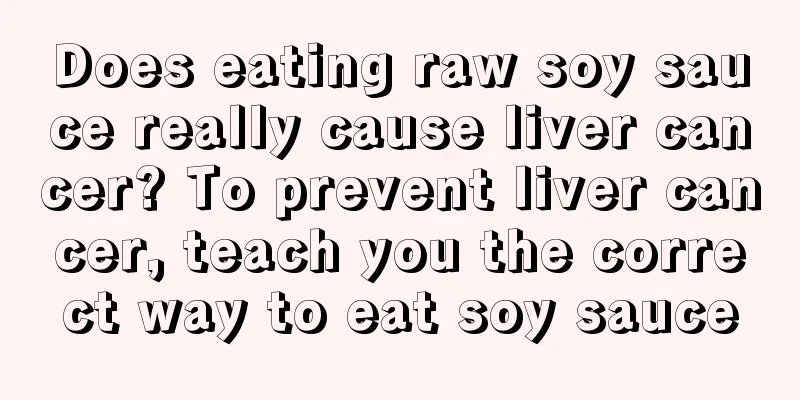Does eating raw soy sauce really cause liver cancer? To prevent liver cancer, teach you the correct way to eat soy sauce

|
A few years ago, posts about people getting sick from eating soy sauce raw began to circulate online. A while ago, this topic was brought up again, saying that "eating soy sauce raw will cause liver cancer." This rumor really scared many people. It is normal to mix cold dishes or dip dumplings in soy sauce at home, but how can it cause liver cancer?! What's going on? Soy sauce is a common condiment in daily life. It plays the important role of adding color, flavor and freshness to Chinese cuisine. It is indispensable for making braised or sauce-flavored dishes. According to the production process, soy sauce is divided into "brewed soy sauce" and "compounded soy sauce". 1. Brewed soy sauce: Made from soybeans, wheat, etc. through microbial fermentation. 2. Prepared soy sauce: It is made mainly from brewed soy sauce, mixed with acid-hydrolyzed vegetable protein seasoning liquid, food additives, etc. In terms of usage, soy sauce can be divided into "cooking soy sauce" and "table soy sauce". 1. Cooking soy sauce: soy sauce that is not eaten directly and is suitable for cooking and processing. 2. Table soy sauce: soy sauce that can be eaten directly and can also be used for cooking. In layman's terms, cooking soy sauce is used for cooking, while table soy sauce can be eaten directly as a condiment. The soy sauce that cannot be eaten raw mentioned on the Internet refers to cooking soy sauce. Since the two types of soy sauce are used differently, their hygiene requirements are also different. Table soy sauce can be eaten directly without heating, so the microbiological regulations are naturally slightly stricter than those for cooking soy sauce. my country's "Soy Sauce Hygiene Standard" (GB2717-2003) stipulates that the total colony count of table soy sauce shall not exceed 30,000 cfu/ml, but there is no such requirement for cooking soy sauce. So, is cooking soy sauce unsafe? Of course not! In terms of food safety, pathogenic bacteria are our focus. The total colony count is just a hygiene concept used to reflect the sanitary conditions of the food production process. The total colony count is not equal to harmful bacteria. Whether it is cooking soy sauce or table soy sauce, the national standard clearly stipulates that pathogenic bacteria must not be detected. Cancer "suspect" The saying that soy sauce causes cancer is mainly directed at these things. Halophilic bacteria: Some people say that halophilic bacteria exist in soy sauce and can survive for a long time. Yes, soy sauce can indeed be contaminated by halophilic bacteria, but such soy sauce can cause nausea, vomiting, abdominal pain, and diarrhea, but it has nothing to do with liver cancer. Aflatoxin: Some people say that aflatoxin in soy sauce can cause liver cancer. This is not true. The national standard clearly stipulates that aflatoxin B1 should not exceed 5μg/L for both cooking soy sauce and table soy sauce. If you consume qualified soy sauce, you don't have to worry about aflatoxin. 4-Methylimidazole: Some people say that there is a carcinogen 4-methylimidazole in soy sauce. This substance comes from the caramel color added to soy sauce. A small amount of 4-methylimidazole may be produced in the caramel color produced by certain processes. First, not all soy sauces contain 4-methylimidazole; second, even if there is, it is only a trace amount, and the 4-methylimidazole consumed from soy sauce every day is not a big deal; third, the carcinogenicity of 4-methylimidazole has only been observed in some animal experiments, and there is currently no evidence that humans are carcinogenic to 4-methylimidazole. Nitrosamines: Some people say that soy sauce mixed with nitrites in saliva will produce carcinogenic nitrosamines. In theory, nitrites can react with amines to form nitrosamines, but this process depends on the amount of nitrites and amines, as well as specific pH values, temperatures, and the presence of certain microorganisms. In reality, as long as you don't ingest a lot of nitrite, you don't need to worry about nitrosamines. Eat soy sauce with confidence As a condiment, the consumption of soy sauce is not large. As long as you buy regular and qualified soy sauce, you don't need to worry about this or that substance. There is no need to worry about whether it is eaten raw or cooked. If it really causes cancer, it doesn't matter whether you eat it raw or cooked. Although cooking soy sauce is not a big problem even if it is eaten raw, since soy sauce is divided into "cooking version" and "table version", it is best to follow the rules and use the "cooking version" for cooking, and use the "table version" for dipping dumplings and cold dishes. You should choose regular soy sauce products that meet national standards, and do not buy bulk soy sauce without any testing. Soy sauce is fermented from soybeans, wheat and other raw materials, and is rich in nutrients. It is easy to mold if not stored properly. After opening, the soy sauce should be kept in a cool and airtight place, but it should not be stored for a long time. |
Recommend
What to do if the rectal mucosa is congested and edematous
The rectal mucosa is congested and edematous, so ...
Will sleeping together cause molluscum contamination?
Infectious diseases are a relatively special type...
Is it necessary to remove the uterus for ovarian cancer?
Whether ovarian cancer requires a hysterectomy sh...
What is the best way to treat liver cancer? A detailed explanation of the ultrasonic interventional treatment method for liver cancer
Liver cancer refers to malignant tumors that occu...
What are the clinical manifestations of pituitary tumors
Pituitary tumor is a tumor. The treatment of pitu...
How to wash off oil stains on clothes
There are usually some oil stains on our clothes ...
What is the reason for sour mouth
If there are some problems with our body organs, ...
What are the early symptoms of asthma?
Asthma is quite common nowadays. When the weather...
Will you lose weight if you gain weight during puberty
During adolescence, the body's metabolic capa...
What is pectin
What is pectin? Many people are not very clear ab...
What disease may cause skin depression
If you suddenly feel depressions on your skin, yo...
Is there any medicine against uterine cancer
Is there any medicine to fight uterine cancer? Ut...
Interpretation: Can you run if you have colorectal cancer?
A statistic conducted by the Department of Oncolo...
Will liposuction reduce weight?
Liposuction will reduce weight, but the range of ...
Is the third stage chemotherapy for ovarian cancer effective?
Is chemotherapy effective for ovarian cancer? The...









